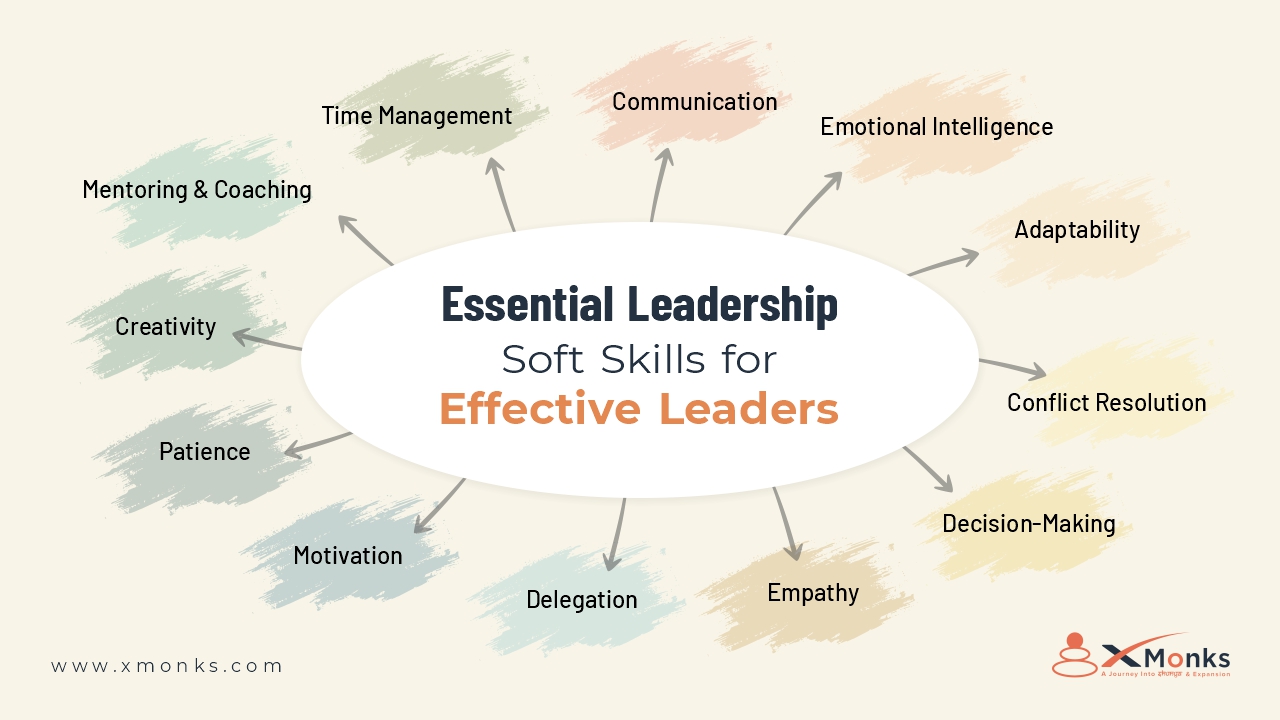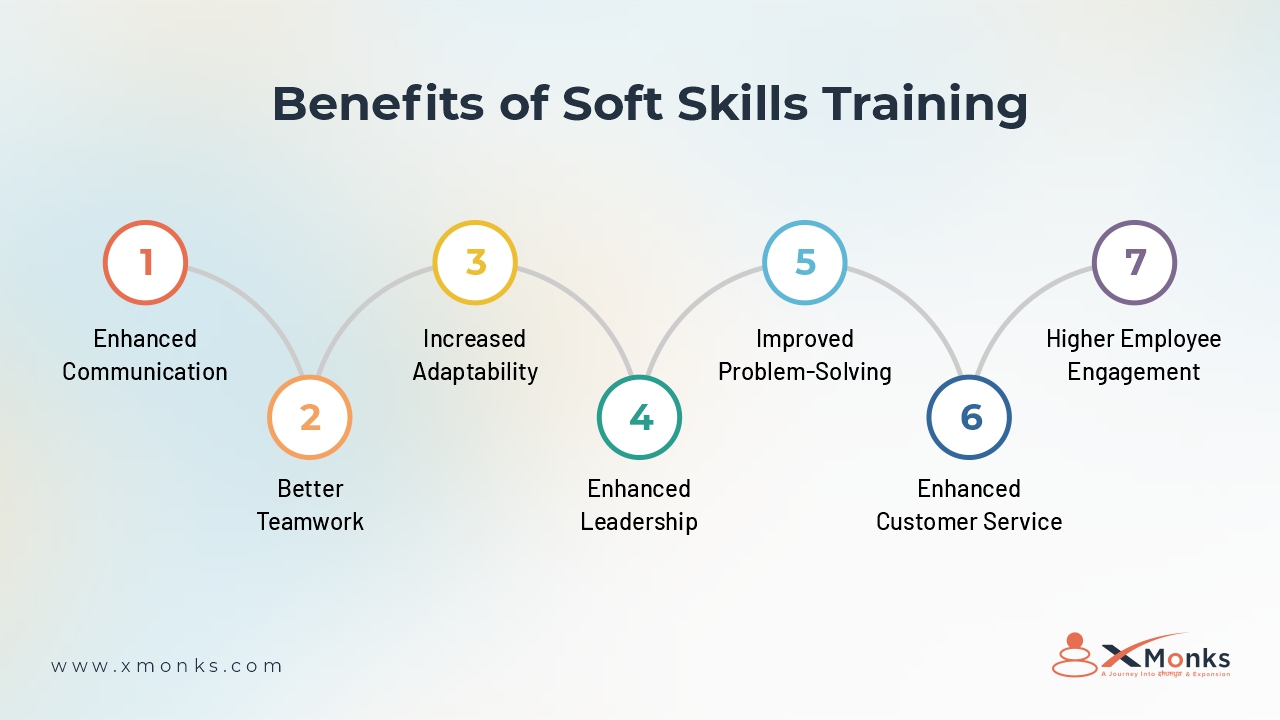Mastering Leadership Soft Skills: The Essential Guide to Soft Skills Training

Introduction
In today’s fast-paced business world, technical expertise alone isn’t enough to lead a team effectively. The importance of soft skills, particularly in leadership roles, cannot be overstated. Soft skills training and developing leadership soft skills are crucial for fostering a productive and positive workplace. This article will delve into the significance of these skills, how to cultivate them, and why they are essential for successful leadership.
What Are Soft Skills?
Soft skills are personal attributes that enable someone to interact effectively and harmoniously with others. Unlike hard skills, which are job-specific and can be measured, soft skills are intangible and harder to quantify. Examples of soft skills include communication, emotional intelligence, problem-solving, and teamwork.
The Transformative Power of Soft Skills Training at the Workplace
In the modern workplace, the significance of soft skills training has become increasingly apparent. As businesses strive to foster environments that are both productive and harmonious, the value of equipping employees with essential interpersonal abilities cannot be overstated. Going further, we will delve into the importance of soft skills training, its myriad benefits, and effective strategies for implementation in the workplace.
Why Soft Skills Matter in Leadership
Enhancing Team Collaboration
Effective leaders need to bring people together, fostering a sense of unity and purpose. Strong soft skills help leaders create an environment where team members feel valued and understood.
Improving Decision-Making
Leaders with well-developed soft skills can make better decisions by considering diverse perspectives and weighing the emotional impact of their choices.
Boosting Employee Morale
A leader’s ability to empathise and communicate positively can significantly enhance employee morale, leading to higher job satisfaction and retention rates.
Essential Leadership Soft Skills for Effective Leaders

The importance of leadership soft skills cannot be overstated. While technical expertise and strategic thinking are vital, it is the leadership soft skills that truly distinguish exceptional leaders from average ones. These skills enable leaders to connect with their teams, inspire action, and foster a positive work environment. Let us explore the key leadership soft skills every effective leader should cultivate.
Communication
One of the most fundamental leadership soft skills is effective communication. Leaders must be able to convey their vision, expectations, and feedback clearly and concisely. Good communication involves not only speaking but also active listening, ensuring that team members feel heard and understood. Effective communication helps prevent misunderstandings, build trust, and promote a collaborative work environment.
Emotional Intelligence
Emotional intelligence (EI) is the ability to recognize, understand, and manage our own emotions, as well as the emotions of others. This leadership soft skill is crucial for resolving conflicts, fostering teamwork, and creating a supportive workplace culture. Leaders with high EI are empathetic, self-aware, and able to navigate the complexities of human relationships, making them more effective in managing and leading their teams.
Adaptability
In today’s fast-paced and ever-changing business world, adaptability is a key leadership soft skill. Leaders must be open to new ideas, willing to change course when necessary, and capable of managing uncertainty. Adaptable leaders are more resilient and better equipped to handle challenges, ensuring their teams can navigate through changes smoothly and continue to achieve their goals.
Conflict Resolution
Conflict is inevitable in any workplace, but how it is managed can make all the difference. Effective conflict resolution is a critical leadership soft skill that involves addressing disagreements in a constructive manner. Leaders who can mediate disputes, listen to different perspectives, and find mutually beneficial solutions help maintain a positive and productive work environment.
Decision-Making
While decision-making often involves hard skills and technical knowledge, the soft skills aspect is equally important. Good leaders use their intuition, empathy, and ethical judgement to make decisions that are not only effective but also considerate of their team’s well-being and morale. This balanced approach helps build trust and respect within the team.
Empathy
Empathy, the ability to understand and share the feelings of others, is a powerful leadership soft skill. Empathetic leaders can connect with their team members on a personal level, providing support and encouragement when needed. This connection fosters a sense of loyalty and motivation among employees, leading to higher job satisfaction and retention rates.
Delegation
Effective delegation is another critical leadership soft skill. Leaders must be able to entrust tasks to their team members, empowering them to take ownership of their work. This not only helps distribute the workload but also builds confidence and skills within the team. Knowing how to delegate effectively also allows leaders to focus on higher-level strategic tasks.
Motivation
Inspiring and motivating a team is a hallmark of strong leadership. Leaders with this soft skill can energise their teams, instil a sense of purpose, and drive them towards achieving their goals. Motivational leaders use positive reinforcement, set clear and achievable targets, and recognize and celebrate their team’s successes.
Patience
Patience is often overlooked but is a vital leadership soft skill. Leaders need to understand that not all team members will learn or adapt at the same pace. Being patient allows leaders to provide the necessary support and guidance without causing undue stress or frustration. This approach helps create a more nurturing and productive work environment.
Creativity
Creativity as a leadership soft skill involves thinking outside the box and encouraging innovation within the team. Creative leaders are open to new ideas and are not afraid to take calculated risks. This fosters an environment where team members feel safe to experiment and contribute innovative solutions, driving the organisation forward.
Mentoring and Coaching
Mentoring and coaching are extremely essential leadership soft skills in the 21st century that contribute to the professional development of team members. Leaders who excel in these areas provide guidance, share their knowledge and experience and offer constructive feedback. This investment in their team’s growth not only enhances individual performances but also strengthens the overall capabilities of the organisation.
Time Management
Effective time management is one of the many leadership soft skills that ensures leaders can juggle multiple responsibilities without compromising on quality. Leaders who manage their time well prioritise tasks,set realistic deadlines, and delegate when necessary. This skill not only enhances personal productivity but also sets a positive example for the team.
Leadership soft skills are essential traits that every effective leader should develop. These skills—communication, emotional intelligence, adaptability, conflict resolution, decision-making, empathy, delegation, motivation, patience, and creativity—enable leaders to connect with their teams, inspire action, and navigate the complexities of the modern workplace. By cultivating these leadership soft skills, leaders can create a positive work environment, drive their teams towards success, and ultimately achieve organisational goals.
Embrace and develop these leadership soft skills to enhance your effectiveness as a leader. Remember, the best leaders are those who combine technical expertise with strong interpersonal abilities, creating a balanced approach to leadership that fosters trust, innovation, and sustained success in the ever-changing business landscape.
Benefits of Soft Skills Training

Enhanced Communication
One of the primary benefits of soft skills training is improved communication. Effective communication is vital in any workplace, ensuring that information is accurately conveyed and understood. Through soft skills training, employees learn how to articulate their ideas clearly, listen actively, and engage in meaningful conversations. This not only reduces misunderstandings but also fosters a collaborative work environment where ideas can flow freely.
Better Teamwork
Soft skills training promotes better teamwork by teaching employees how to work well with others. This includes developing skills such as empathy, conflict resolution, and collaboration. When team members understand each other’s strengths and weaknesses and know how to manage conflicts constructively, they can work together more effectively. This leads to higher productivity and a more harmonious workplace.
Increased Adaptability
The modern workplace is constantly evolving, with new technologies and processes emerging regularly. Soft skills training helps employees become more adaptable, enabling them to handle change with greater ease. By fostering a mindset that is open to learning and growth, employees are better equipped to navigate the uncertainties of today’s business landscape. This adaptability is crucial for maintaining a competitive edge.
Enhanced Leadership
Leadership is not just about making decisions and delegating tasks; it also involves inspiring and motivating others. Soft skills training enhances leadership by developing essential traits such as emotional intelligence, empathy, and effective communication. Leaders who possess these skills are better able to connect with their teams, build trust, and foster a positive work culture. This results in higher employee morale and retention.
Improved Problem-Solving
Problem-solving is a critical skill in any job. Soft skills training equips employees with the tools to approach problems creatively and think critically. By learning how to analyse situations, consider various perspectives, and develop innovative solutions, employees can tackle challenges more effectively. This not only improves individual performance but also contributes to the overall success of the organisation.
Enhanced Customer Service
Customer service is a key area where soft skills training can make a significant impact. Employees with strong soft skills are better able to understand and meet customer needs, handle complaints effectively, and provide a positive customer experience. This leads to increased customer satisfaction and loyalty, which are essential for business growth and success.
Higher Employee Engagement
Engaged employees are more productive, motivated, and committed to their work. Soft skills training fosters a positive work environment by promoting open communication, teamwork, and mutual respect. When employees feel valued and supported, they are more likely to be engaged and invested in their roles. This, in turn, leads to higher levels of job satisfaction and performance.
The benefits of soft skills training are far-reaching, impacting both individual employees and the organisation as a whole. From enhanced communication and teamwork to improved problem-solving and leadership, soft skills training equips employees with the essential abilities needed to thrive in the modern workplace. By investing in soft skills training, organisations can create a more dynamic, adaptable, and productive workforce, ultimately driving business success.
How to Develop Leadership Soft Skills
Self-Assessment and Reflection
Understanding your strengths and weaknesses is the first step toward improvement. Regular self-assessment and reflection help identify areas for growth.
Seeking Feedback
Constructive feedback from peers, mentors, and team members can provide valuable insights into your soft skills development.
Continuous Learning
Soft skills development is an ongoing process. Engaging in workshops, reading relevant literature, and practising new techniques are essential for continuous improvement.
Effective Soft Skills Training Programs
In-House Training
Organisations can develop custom training programs tailored to their specific needs, fostering a culture of continuous improvement.
Online Courses and Workshops
There are numerous online platforms offering courses and workshops on soft skills. These can be convenient and cost-effective ways to enhance your abilities.
Mentorship and Coaching
Personalised mentorship and coaching can provide targeted guidance and support for developing leadership soft skills.
Implementing Soft Skills Training in Your Organisation
Conduct a needs assessment to determine which soft skills are lacking in your organisation and prioritise training accordingly. Clear, measurable goals and objectives will help track the effectiveness of your training programs. Regular evaluations and feedback mechanisms are crucial for assessing the impact of soft skills training and making necessary adjustments. Let us look at these pointers individually-
Successfully integrating soft skills training into your organisation requires thoughtful planning and execution. Here are some strategies to consider:
Tailored Training Programs: Develop training programs that are tailored to the specific needs of your organisation. This can involve customised workshops, seminars, or online courses.
Interactive Learning: Use interactive methods such as role-playing, group discussions, and simulations to engage employees and enhance learning outcomes.
Continuous Development: Soft skills development should be an ongoing process. Encourage continuous learning through regular workshops, mentoring, and access to online resources.
Incorporating Feedback: Regularly solicit feedback from employees to gauge the effectiveness of training programs and make necessary adjustments.
Challenges in Soft Skills Training
Employees may resist new training initiatives. Overcoming this requires clear communication about the benefits and support from leadership. Finding time for training amidst busy schedules can be challenging. Prioritising and integrating training into the workday can help mitigate this issue. Quantifying the return on investment for soft skills training can be difficult. Focus on qualitative improvements and employee feedback to gauge success.
While the benefits of soft skills training are evident, its implementation can be challenging. Here’s how to address some common obstacles:
Gaining Buy-In: Employees may be sceptical about the value of soft skills training. Address this by clearly communicating the benefits and sharing success stories from within the organisation.
Balancing Time: Finding time for training in a busy work schedule can be difficult. Integrate training sessions into regular meetings or dedicate specific times during the workweek for development activities.
Measuring Impact: Quantifying the impact of soft skills training can be challenging. Use a combination of qualitative and quantitative measures, such as employee feedback, performance reviews, and observed behavioural changes.
Case Studies of Successful Soft Skills Training
Example 1: Company A
Company A implemented a comprehensive soft skills training program, resulting in improved team collaboration and a 20% increase in employee satisfaction scores.
Example 2: Company B
After introducing emotional intelligence workshops, Company B saw a significant reduction in workplace conflicts and an overall boost in productivity.
Here are a few more real world examples of how different companies have successfully implemented soft skills training:
Tech Innovators Inc.: This company introduced a series of workshops focused on emotional intelligence and communication. As a result, they saw a significant improvement in team dynamics and a reduction in workplace conflicts.
Global Solutions Ltd.: By incorporating problem-solving and creative thinking training into their onboarding process, this organisation boosted innovation and enhanced their ability to tackle complex projects.
Customer First Corp.: Focusing on client relationship management and empathy, this company improved customer satisfaction scores and increased client retention rates.
Tools and Resources for Soft Skills Training
Books and Articles
Numerous books and articles provide valuable insights into developing soft skills. Titles like “Emotional Intelligence 2.0” and “Crucial Conversations” are excellent starting points.
Online Platforms
Websites like Coursera, LinkedIn Learning, and Udemy offer a wide range of courses on various soft skills topics.
Professional Organisations
Organisations such as the International Coach Federation (ICF) provide resources and certification programs for leadership development.
Future Trends in Leadership and Soft Skills
Artificial intelligence and technology are reshaping the way we work, necessitating a continuous evolution of soft skills to stay relevant. As workplaces become more diverse and remote work becomes more common, leaders must adapt their soft skills to manage these changes effectively. The landscape of soft skills training is also continually evolving. Here are some trends to watch out for:
Integration of Technology: The use of AI and virtual reality in soft skills training is becoming more prevalent, offering immersive and personalised learning experiences.
Focus on Diversity and Inclusion: Training programs are increasingly emphasising the importance of diversity, equity, and inclusion, helping organisations build more inclusive workplaces.
Remote Work Adaptation: With the rise of remote work, soft skills training is adapting to address the unique challenges of virtual communication and collaboration.
Investing in soft skills training at the workplace is essential for nurturing a dynamic, innovative, and harmonious work environment. By prioritising the development of interpersonal abilities such as communication, emotional intelligence, and adaptability, companies can cultivate a more engaged and resilient workforce. The benefits are clear: stronger teams, improved leadership, better client relationships, and reduced turnover. Embrace soft skills training to unlock your organisation’s full potential and thrive in the modern business landscape.
Conclusion
Soft skills are crucial for effective leadership. Investing in soft skills training not only enhances individual capabilities but also fosters a positive and productive work environment. By understanding the importance of these skills and committing to continuous development, leaders can drive their organisations toward success.

